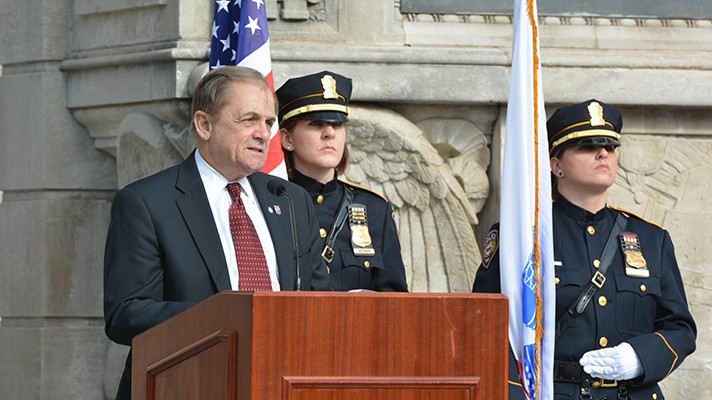
Courtesy of Michael Morand
When Elizabeth Verardo GRD ’16 first came to Yale as a student at the Jackson Institute for Global Affairs in 2014, straight off her second deployment to Afghanistan where she flew Apache helicopters, she was worried she would have trouble fitting in among Yale’s cloistered classrooms and students who had never been in a war zone.
Now, the University has created a new position designed to help veterans like Verardo adjust to University life. On Monday, University Provost Ben Polak announced the appointment of Jack Beecher MPH ’84 to the new position of veteran liaison, effective Feb. 1. Beecher — a New Haven native who ushered at the Yale Bowl in the 1960s, fought in the Vietnam War in the Air Force and later earned his Masters in Public Health from Yale — has worked at the University for decades in the Child Study Center, the School of Medicine and most recently as senior director of professional schools and academic support. As veteran liaison, he will be responsible for helping Yale’s veterans access services and resources both on and off campus. His appointment comes at a time when the University is taking a renewed focus on its veteran community, including partnering with a nationwide organization to increase the number of veterans studying on campus.
Verardo, who is now president of the Yale Student Veterans Council, said she thinks the new position will centralize the many disparate veteran groups at Yale, including the Yale Veterans Association, the Yale Veterans Network and the Student Veterans Council.
“We’re paddling in the same direction, but this helps us come together,” Verardo said.
The idea of creating a veteran liaison began with Polak, who after discussions with Beecher finally asked him if he would like to fill the role. Beecher, who is retired, agreed to take on the part-time position. He will report directly to Associate Vice President for Human Resources Donna Cable.
Polak said Yale does not know the exact number of veterans at Yale, as veterans self-report their status.
“Jack is especially suited to this job,” Polak said. “He is himself a veteran, and he has long experience at Yale. No one knows Yale better than Jack, and no one is more widely respected.”
Beecher said that when he began working at Yale 27 years ago, there was very little in the way of awareness of veterans who worked or went to school here. Gradually over the years, with help from Linda Lorimer — then the vice president for global and strategic initiatives — veterans at Yale began to see more resources and commemorative ceremonies. In 2001, Lorimer increased the prominence of Veteran’s Day ceremonies at Yale.
The reinstatement of the Reserve Officers’ Training Corps program on campus in 2012 — after the repeal of “Don’t Ask, Don’t Tell” — further heightened the visibility of the military at Yale.
“From that day forward, the visibility of vets on campus increased,” Beecher said. “[Promoting veterans’ resources] is something that has been very near and dear to me.”
Verardo said Yale has been a pioneer among other top-tier schools for its work with its veterans. Though her transition to University life was significant, Verardo said the people she has met at Yale have been curious about her experiences and generally positive.
But the University is still looking to increase veteran representation. Beecher said he will meet soon with Dean of Undergraduate Admissions Jeremiah Quinlan about expanding the veteran population in the student body.
Eli Whitney student Rob Henderson , who served in the United States Air Force before coming to Yale, said that although Yale is making progress, most of his veteran friends are in the graduate school, and he wishes the undergraduate veteran community were larger.
“It might be nice to have a community and more of a peer-to-peer network. It can be a little bit isolating for some of us,” Henderson said. “It does seem like Yale has been making an effort to bring more vets to campus, slowly.”
Henderson also cited VetLink, a nationwide initiative that identifies qualified veterans and help them attend top-tier schools, as an organization that is effectively working to send more veterans to schools like Yale after their military service. Yale announced its partnership with VetLink last June.
ROTC member Sierra Jackson ’18 said that although there are not many undergraduate veterans, she is in contact with several who are Eli Whitney students. Jackson emphasized the importance of veteran role models to students like her who are entering the military.
Still, Henderson was enthusiastic about the resources available to him as a veteran. Questions about how to best spend his GI Bill money and where to find affordable housing in the city are issues he enjoys discussing with fellow veterans and Eli Whitney students, he said.
Yale has deep ties to the military, Beecher said, adding that Yale’s commitment to military service is returning. From 1988 until around 2000, Beecher said there was little or no interest about the military status of people at Yale, a climate that reflected most of American society at the time. Now, he said, Yale is beginning to realize that the military aligns with Yale’s commitment to service.
The leadership skills and life experiences that the military teaches can make Yale a better place to work and study, he added. However, not all veterans identify as such, and Beecher said Yale can better communicate with its veteran population and help to “normalize” being a veteran on campus.
“This is just a beginning,” he said. “I think things at Yale evolve, and we’re trying to test and understand the community and what the needs are.”
Yale’s most prominent war memorial sits on Hewitt Quadrangle and was built in 1927 to honor the Yale alumni who died during World War I.
Correction, Feb. 7: A previous version of this article incorrectly described the Eli Whitney Program as a veterans organization.







